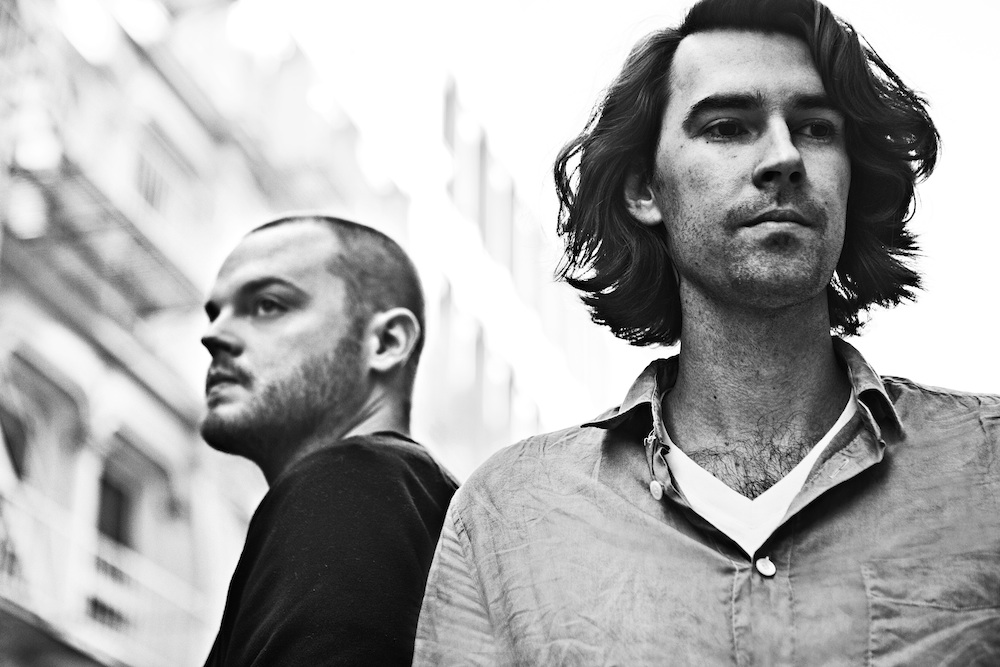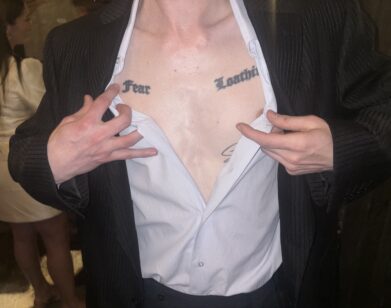The Life of Limetown

ABOVE: ZACK AKERS (LEFT) AND SKIP BRONKIE IN NEW YORK, OCTOBER 2015. PORTRAIT: VICTORIA STEVENS. GROOMING: ELIZABETH LERMAN FOR EXCLUSIVE ARTISTS MANAGEMENT USING R+CO HAIR CARE AND LAURA MERCIER.
“The moment I found out we’d moved to number one on the iTunes chart, I was setting up the reception hall for my wedding the next day,” says Zack Akers, one of the showrunners of the independent podcast Limetown. “I couldn’t process it. I just put my phone away and was like, ‘Alright. I’m done here.’ And then I had to get married,” he continues.
Entirely fictional and read by professional actors, Limetown is an eerie mystery framed as a series of NPR-like investigative reports. Ten years ago, Lia Haddock lost her estranged uncle when over 300 inhabitants of a gated community in Tennessee vanished. Known as Limetown, the site was part-scientific research center, part-utopian collective. Everyone fulfilled multiple roles: neurologists acted as part-time janitors; veterinarians took tickets at the movie theater. Then, suddenly and simultaneously, they disappeared. Now a journalist at APR, Haddock is determined to unravel the secret of Limetown.
Akers and his Limetown co-creator Skip Bronkie first met a decade ago while studying film at NYU. Bronkie grew up making ski films in his backyard outside of Buffalo, New York, and has spent the last 10 years working at Facebook in Silicon Valley. Raised in Tennessee, Akers first knew he wanted to be a director in junior high school. Until last month, he worked on sports documentaries for the likes of HBO and ESPN. “I feel like I’ve been apprenticing a lot in the discipline of film, so of course we made a podcast,” he jokes.
Before releasing Limetown‘s pilot episode in July, Akers and Bronkie pitched the series to podcast producers and evolving media companies such as Amazon, HBO, and Showtime. When they couldn’t find an established distributor, the duo decided to start their own media company, Two-Up Productions. Neither of them anticipated Limetown‘s level of success. They were hoping the show would reach 10,000 listeners in its first season; it surpassed that number within the first few days. Now, with three episodes and one two-minute “Quick Apology” available on their website, iTunes, YouTube, and Soundcloud, Akers and Bronkie have a cult following.
EMMA BROWN: I was explaining Limetown to my boyfriend: “It’s a podcast, but fictional!” He pointed out that a fictional podcast is essentially a radio show. Limetown feels very new because you don’t really think of podcasts that way, but it’s actually a very old format.
ZACK AKERS: It’s the oldest form of mass entertainment that there is. When we came to the idea, it was a matter of, “We have limited resources, we have limited time, how do we execute our story that we want to tell?” Podcasts happened, World War Z happened. We read the book and we had a whole conversation about it: “What if we just made something up and did an oral history together?” That was the seed: We’ll take our fiction and we’ll shove it into This American Life and see what comes out. But my dad loves it because it’s very reminiscent of another time, which is cool. It is for the podcast community, but it’s also for people who have no idea what a podcast is—people who used to listen to the radio.
SKIP BRONKIE: There was this whole era where the best writers, directors, producers, and actors were all making radio dramas and then television came along and it just stopped. We were asking ourselves, “Why did no one pick this back up again when 200 million people have iPhones that have the podcast app and could be listening to interesting, fictional shows on their commutes or while running or doing anything active at all?” Nobody’s done it.
AKERS: I would ride the subway every day and everybody has ear buds in. It’s like, “We could exploit that market pretty easily.” It just seems so obvious. When you have the idea, it’s like, “Of course. Why aren’t other people doing this?” That’s been our whole thing, stumbling into this weird void that shouldn’t exist, but does. For the time being, we’ve captured that.
BROWN: You met at NYU, correct?
AKERS: Yeah, we both went to film school and I met him on a shoot my junior year—[to Bronkie] your sophomore year. He was the AD on a shoot and I think I was the sound guy. Everyone on that set was part of a group except for him—he was the new guy the director had brought in—and we became friends and have been friends ever since. We were roommates for a while. But we always wanted to work together.
BROWN: Is this your first time working together professionally?
BRONKIE: Yeah, we’ve been talking about it for a long time. It had been my goal to start a feature film production company since college. A year ago, July 17, 2014, I said, “In one year, I’m leaving my job to start this and I hope you’ll do it with me.” And we followed through.
AKERS: We’ve given ourselves six months to do something. We started September 1st, so it’s been okay for the first month, but we’ll see.
BROWN: No plans to return to the daily grind?
BRONKIE: Not right now. But we’re not taking any of this for granted. We know it can go away quickly.
AKERS: As quickly as it came up, it can be torn down. We’re aware of that.
BROWN: You have about 27 or 28 actors in the show, right?
AKERS: In the pilot.
BROWN: Do you have people double up on roles throughout the series?
BRONKIE: We haven’t yet.
AKERS: We’ve talked about it before. There are voices in the pilot that are pretty different from the person’s actual voice that we could reuse if we wanted to, but we have a casting director and we’ve been able to cast for every role we’ve created—a unique role.
BRONKIE: It’s something we took really seriously from the start. Where a lot of the things fall apart on the fictional side is in the casting. You put your friend in because your friend’s like, “Oh, I’m a voice actor,” or “I can do this funny voice,” but you don’t actually cast professional actors or actresses. From the start, we mainly hired from SAG and anybody who was union and got really talented actors and actresses involved.
BROWN: But the girl who plays Lia isn’t union.
BRONKIE: She’s not, no, but she’s fantastic. [laughs] She should be union!
AKERS: She was the first voice we heard. I remember getting the sides. I was sitting on my couch at home—it was a Saturday morning—and I was like, “This is awesome, we get to hear all these voices.” She was the first read and it was just like, “Oh my god, that’s her.” She just got it immediately. We had to listen to 75 other actresses before I was like, “No, it’s the first one.” She really brings it to life.
BROWN: Did you find a lot of actors were keen to audition for a podcast?
BRONKIE: Yeah. There is a wealth of talent here in the city.
AKERS: We’ve discovered actors love this whole process. To audition, you submit audio sides—you don’t have to go somewhere and stand in front of people that have to pretend that they don’t like you. That’s always the worst part, when an actor walks in you have to be like, “Hmm. Okay. Great. We’ll talk to you later. Our assistant will call you.” For this, you submit sides, we listen to them, if we cast you, you come in and you could be in your pajamas if you want. You don’t have to put on any makeup, there’s no lighting, there’s no blocking. You just walk in, you give a performance, we give you money, and you leave. It’s the easiest version of their job. It’s the most stripped down thing. You get really great performances from people because that’s all they have to worry about.
BROWN: In the very first episode, Lia says, “This is going to be a seven-part series.” What made you decide on seven episodes and how did you justify Lia knowing how many parts there would be?
BRONKIE: Well, I will say this: she does say it’s a seven-part series in the first episode, but that’s before the survivor comes out in the end. Since that point forward, she hasn’t really brought up that number.
BROWN: So it might not be seven?
BRONKIE: Who’s to say how many episodes there will be at this point…
AKERS: [laughs] We don’t want to ruin anything for anyone.
BROWN: When we were talking about doing this interview, you told me when the next episode was coming out and I felt like I had such an inside scoop. Then I looked at your Twitter and it was the first thing there.
AKERS: That’s part of what we’ve discovered with this. We made the decision pretty early on to not worry about a regular cadence and make the best shows, and because of that, we can do things like make a trailer and put it out the week before and people will get really excited that it’s coming. That sort of mystery about when the episodes come out is really working in our favor. It frustrates people, but there are worse problems than people really wanting to hear your show. As long as you don’t string them along too much, and I don’t think we have. It’s been fun toying with the audience in that specific way.
BROWN: When I heard the first episode, it reminded me a little of an NPR story on the Endicott Johnson company, which had all of its workers live together in this constructed town. What were some of the real-life inspirations behind Limetown?
AKERS: The city that I thought of—beyond Roanoke and that whole thing—was Fordlandia, which was this vision from Ford to build the dream city in the Amazon where they would make rubber. They sunk a lot of money into it and it was a complete failure, but it was an interesting concept to me: “We’re going to build a utopia in the middle of the jungle,” and then the jungle won.
BRONKIE: For me, I kind of experienced this first hand out in Silicon Valley. You go to the Facebook campus and you have a dessert shop, you have restaurants, you have a barber. It’s incredible, but it feels odd to know that your whole life could be there—everything you need.
AKERS: That was probably the biggest part of it. We were having conversations about weird projects that Google is doing.
BRONKIE: Barges are being built on the coast of the Bay, and people don’t know what’s happening on those barges. We just know that the property is licensed and owned by Google.
AKERS: They have the resources to do whatever they want. That was where a lot of the idea came from, these sort of ambitious tech companies with unlimited resources. How can we play with that idea and, I don’t want to say the dangers of that, but sort of the dark side—twisting it beyond just, “Oh, this is great.” It was a lot of conversations based on our shared knowledge.
BROWN: I heard that Limetown was going to be set in South Dakota, and then you moved it to Tennessee. Is that true?
AKERS: Yeah. The caves were an important element of it; South Dakota has a big cave system and Tennessee has one of the biggest natural cave systems in the world. We were talking about that and Skip said, “Why don’t we just set it in Tennessee?” and I said, “It’s weird, it’s where I’m from,” and he’s like, “Yeah, but no one knows that. Tennessee is just as weird as South Dakota. It’s just as foreign to people. It’s just as strange to set it there.” Then it was like, “That makes sense. Why not?” It’s what I know; it’s where I’m from.
BROWN: Do you ever argue about what should happen?
BRONKIE: On the story side, our sensibilities are pretty aligned.
AKERS: Skip knows what works and what doesn’t work, and then knows how to execute what does work. I can come and be like, “What if we do this?” and he goes, “I like this part of it, I don’t like that part, and here’s how we do the first part.” I think that is, at its core, how this works.
BRONKIE: We might collaborate on the story for the season and episode, but Zack writes these scripts. He is a brilliant writer and I’m not. One thing I made clear—because there are other people involved in this too—is I’m not very interested in having the scripts written by committee. It is Zack’s singular vision when you read that script and hear those voices. Dialogue written by committee sounds like dialogue written by committee, and that’s not what this show is.
AKERS: But we do fight all the time. [laughs] We just edited three minutes out of our last show, and every single line was a fight. It’s not just me being like, “Hey, that’s my line!” It’s Skip being like, “Hey, that’s your line! Keep that in!”
BRONKIE: He’s like, “No, I don’t think it’s working.”
AKERS: So that conversation happens all the time.
BRONKIE: Friendly arguments. [laughs]
AKERS: But if you can’t have those fights and those arguments, then you’re going to have bad work. We know how to fight with each other in a constructive way.
BROWN: Do you get a lot of emails to the gmail account you have listed on your website?
AKERS: Oh yeah. A lot of it is just really encouraging fans: “We really love the show,” “Great work,” “Where’s the next episode?” We got someone who said that she lives in Nashville and was about to drive to Limetown before she went on the website and find out it was fictional. It’s funny, because I don’t know what people think, but it’s literally just Skip and I [reading the emails]. It’s not like there’s a gatekeeper.
BRONKIE: My mom had never listened to a podcast before. We were driving one day and I was like, “Oh, I’ll play you Limetown.” Then I wanted to give her an example of what one of the best podcasts in the world would be, so I played her This American Life. I picked an episode that I had heard recently, which was really interesting, about the Chicago public school system. I wanted to show her what this could be and what we could be doing sometime in the distant future. Ten minutes into it, she’s like, “I don’t like this actress as much as your lead actress.” I hadn’t even thought about it, but because her introduction to podcasts was our fictional show, she assumed all podcasts were fiction. That would be a cool world to get to. If your natural inclination listening to podcasts wasn’t just that it’s a nonfiction, journalistic show, but it could be something that’s actually narrative.
FOR MORE ON LIMETOWN, VISIT THE LIMETOWN WEBSITE.






